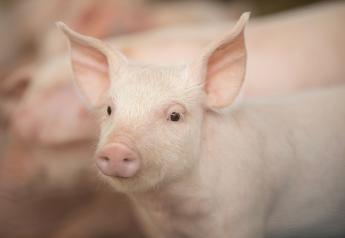Olympic Hopeful Blames Failed Drug Test on Pork Burrito; Pork Industry Sets the Record Straight

An Olympic runner banned from competing in the upcoming Tokyo Olympics is blaming pork. Shelby Houlihan was banned from the sport for four years after a positive test for nandrolone, which is an anabolic steroid.
Houlihan says she originally received the positive drug test in December, when she received an email from the Athletics Integrity Unit (AIU), which is an independent body that monitors doping in athletes. The note informed Houlihan she tested positive for nandrolone, which Houlihan says came as a shock.
"I want to be very clear. I have never taken any performance-enhancing substances. And that includes that of which I am being accused," the 28-year-old runner said in a social media post.
Houlihan, 28, made her first U.S. Olympic team in 2016 with a runner-up finish in the women’s 5,000 meters, but the returned test this year showed 5 ng/mL of nandrolone in her system.
"We concluded that the most likely explanation was a burrito purchased and consumed approximately 10 hours before that drug test from an authentic Mexican food truck that serves pig offal near my house in Beaverton, Ore.," she said in an Instagram post on June 11.
U.S. Pork Production's Track Record
Houlihan claims that her positive steroid test came from eating pork, but is that even possible? Pork industry experts and scientists say it can happen, but it’s not from hormones used in actual pork production.
“There are not any, nor have there ever been, any hormones approved for use in pork production,” says Scott Radcliffe, professor with the Department of Animal Sciences at Purdue University.
So, if hormones aren’t approved for pork production, how is it possible a person could have traces of steroids in their blood from eating pork? Radcliffe says the answer is tricky.
“Hormones are naturally produced in animals and even in plants,” adds Radcliffe. “So, it is possible for humans to consume hormones in their diet. The best documentation of this may be phytoestrogens from soy. Most pork in the U.S. comes from prepubertal females or castrated males, and therefore, hormone concentrations would be very low. That being said, if boar meat were consumed, concentrations could be higher, but I don’t know whether this could lead to an increased concentration or not in human urine or blood.”
Should Consumers Worry About Hormones in Pork?
Dr. Heather Fowler, director of producer and public health for the National Pork Board (NPB), says the literature suggests it is possible that a person can excrete nandrolone if they consume boar meat, which NPB says makes up significantly less than 1% of commercial pork production today, so small it’s not tracked nationally.
“Some research suggests that the naturally occurring hormones in the meat and organs of intact male pigs, known as boars, can impact nandrolone test results, but the vast majority of the pork consumed in the United States does not come from boars,” Fowler says.
Collette Kaster, CEO of the American Meat Science Association (AMSA), says pork sourced from intact males in the US is not common, but that some specialty markets do provide meat from boars.
“While the vast majority of male pigs in the US are castrated, certainly some markets and sources might choose to use pork from young intact males and it might be more likely with a unique purveyor such as a food truck,” says Kaster.
The answers align with Houlihan’s claims of eating pork from an authentic Mexican food truck 10 hours prior to her test.
"Although my levels were consistent with those of subjects in studies who were tested 10 hours after eating this source and WADA technical guidelines require the lab to consider it when analyzing nandrolone, the lab never accounted for this possibility," the athlete said during a press conference.
Setting the Record Straight
As headlines continues to circulate about the runner’s steroid claims, Fowler insists the pork raised by U.S. pigs farmers is a valuable source of nutrition and protein for athletes. She says U.S. pork producers face strict food safety and production standards, which ensure the pork consumers eat is safe.
“The U.S. has some of the strictest food production and safety standards in the world, with regulations enforced by both the U.S. Department of Agriculture and the Food and Drug Administration. Consumers can feel confident that eating a pork chop from their local grocery store or a side of bacon at their favorite local breakfast spot should not be cause for concern,” Fowler says.
A study funded by the World Anti-Doping Agency (WADA) in 2015 found trace amounts of nandrolone can be found in boar meat and warned about the possibility of a false positive. However, as Houlihan continues to combat the AIU test results, her hopes of competing in the U.S. Olympics continue to get denied.
"I did everything I could to prove my innocence," Houlihan said in a Sports Illustrated report. "I passed a polygraph test. I had my hair sampled by one of the world's foremost toxicologists. WADA agreed that test proved that there was no buildup of this substance in my body, which there would have been if I were taking it regularly. Nothing moved the lab from their initial snap decision."







